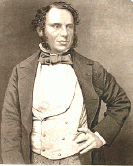
(1812-1900)

Henry Russell. The descriptive songs and ballads of this composer and vocalist are still much in vogue. He spent much of his time in Baltimore, though New York was his headquarters. In person he was rather stout, but not tall. His face was quite prepossessing, of the Hebrew cast, dark and heavy whiskers and curly hair. He was an expert at wheedling audiences out of ap- plause, and adding to the effect of his songs by a brilliant pianoforte accompaniment. With such self-laudation he used often to describe the wonderful influence of his descriptive songs over audiences. On one occasion he related an incident connected with "Woodman, Spare that Tree." He had finished the last verse of the beau- tiful words, written by his highly esteemed friend Gen. George P. Morris. The audience were spell-boud for a moment, and then poured out a volume of applause that shook the building to its foundation. In the midst of this tremendous evidence of their boundless gratifica- tion, a snowy-headed gentleman, with great anxiety depicted in his venerable features, arose and demanded silence. He asked, with a tremulous voice: "Mr. Rus- sell, in the name of Heaven, tell me, was the tree spared?" "It was, sir," replied the vocalist. "Thank God! thank God! I breathe again!" and then he sat down, perfectly overcome by his emotions. This miser- able bombast did not always prove a clap-trap; in many instances it drew forth hisses. Russell's voice was a baritone of limited register; the few good notes he possessed he turned to advantange. His "Old Arm-chair," for instance, has but five notes in its melodic construction. This was one of his most popular songs; its circulation was outstripped only by "Life on the Ocean Wave" and "I'm Afloat," two fine sea-songs. The history of the former is thus related: Some thirty years ago, Russell asked Mr. Epes Sar- gent to write songs for him, leaving the subject to the author's selection. In a walk on the Battery, New York, the sight of the vessels in the harbor dashing through the sparkling waters in the morning sunshine, suggested the "Life on the Ocean Wave," and the poet had finished it in his mind before the walk was completed. Upon showing it to a friend, himself a song-writer, his criticism was that it was "a very fair lyric, but was not a song." Sargent, somewhat dis- heartened, put the verses into his pocket, concluding that they might do to publish, but not to set to music. A few days afterward he met Mr. Russell in the music store of J. L. Hewitt & Co., and showed him the lines, informing him at the same time that they would not do, but that he would try again. "Let us go into the piano-room, and try it on the instrument," said Russell. They went. Russell sat down before the piano, placed the words before him, studied them attentively for a few minutes, humming a measure as he read, then threw his fingers over the keys; tried once, twice, thrice, and finally exultingly struck out the present melody to which "Life on the Ocean Wave" is set. He certainly was not more than about ten minutes about it, though he gave a day afterwards to scoring and writing out the music. The song become immensely popular on land, and many thousands were sold before the year was out. In England three different music-publishers have issued it in various styles. The parodies that have been made on it are almost innumerable. Russell once called on me and asked me to write him a song on an "Old Family Clock," (he was remarkably fond of the prefix old; a wag of a poet once sent him some words addressed to an "Old Fine-tooth Comb.") I wrote the words. He then changed his mind, and employed me, promising good pay, to write a descriptive song on the "Drunkard," to stir up the temperance people. I pleased him much by beginning the song in this way: "The old lamp burned on the old oaken stool." He made a taking affair of it; and he made money on it too, but I never got his promise to pay. He slipped off to England, and as nothing has been heard of him for many years, I suppose he is "down among the dead men."Webpage contents Copyright © 2000-2002 by Benjamin Robert Tubb. Created on 29 January 2000. Last updated on 7 October 2002.